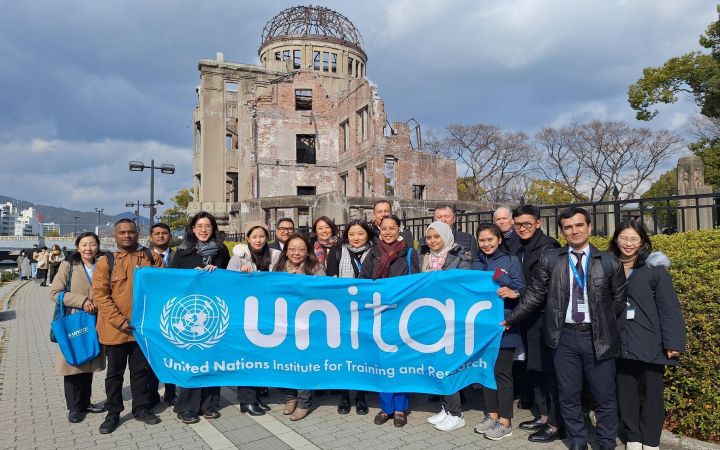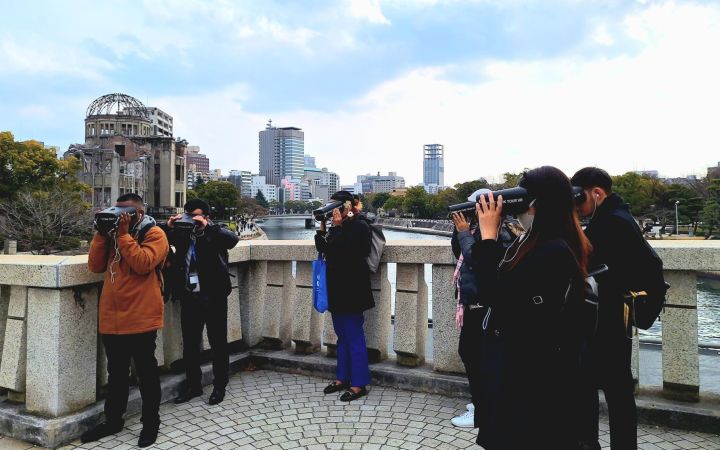the United Nations Institute for Training and Research (UNITAR) kicked off the 10th Nuclear Disarmament and Non-Proliferation training programme in the City of Hiroshima.
3 February 2025, Hiroshima, Japan - The United Nations Institute for Training and Research (UNITAR) kicked off the 6-day Nuclear Disarmament and Non-Proliferation training programme in Hiroshima, with 15 diplomats from 14 Asia-Pacific countries, including countries affected by nuclear tests. The programme seeks to enhance the diplomats' negotiation skills for nuclear disarmament and non-proliferation. It is conducted by UNITAR and the UNITAR Association, with financial support from the Hiroshima Prefectural Government and the City of Hiroshima.
On the first day, the participants deepened their understanding of the reality of the atomic bombing in Hiroshima through a virtual reality (VR) tour of the Hiroshima Peace Memorial Park and a tour of the Peace Memorial Museum.
10th Anniversary of the Training Programme
This year marks the 10th anniversary of the training programme, which has been conducted by the UNITAR Hiroshima Office since 2015. To date, 180 diplomats have completed the programme, many of whom are now using those skills towards nuclear disarmament and non-proliferation.
The programme welcomes training advisors and lecturers, such as Tariq Rauf , Former Head of Verification and Security Policy, International Atomic Energy Agency (IAEA), Tim Caughley , a Non-Resident Senior Fellow for the United Nations Institute for Disarmament Research (UNIDIR), and Yuriy Kryvonos , a Former Director, United Nations Regional Centre for Peace and Disarmament in Asia and the Pacific (UNRCPD). Through sessions conducted by these experts, the participants will learn the global status of nuclear disarmament and non-proliferation, the latest debate concerning nuclear weapons and will also participate in geopolitical simulation exercises.
The year 2025 marks the 80th commemoration of the devastating atomic bombing of Hiroshima and Nagasaki. Despite the lessons from the two tragedies, the world is still far from achieving sustainable peace. Armed conflicts continue to pose risks and take the lives of people around the world, and nuclear disarmament remains one of the United Nations' top priorities. Through this Nuclear Disarmament and Non-Proliferation training programme, UNITAR continues to offer a meaningful learning experience and contribute to nuclear disarmament.
Fostering Nuclear Disarmament Insights with Youth and Citizens
The youth session will be held at the UNITAR Hiroshima Office on 6 February with UNITAR Hiroshima Youth Ambassadors and other local youth working towards nuclear disarmament. The diplomats will have the opportunity to learn about the role of youth in peace education and community initiatives to pass on the testimonies of those affected by the atomic bombing and other local youth working towards nuclear disarmament.
At the same time, the Hiroshima youth will learn from the diplomats working in the nuclear disarmament and non-proliferation field. It will give the youth the chance to further share Hiroshima's message of peace with the world and raise awareness of the significance of peace initiatives for the youth.
On 8 February, the participants will attend the 2-day public event " International Civil Society Forum to Abolish Nuclear Weapons: 80 Years Since the Atomic Bombing ", hosted by the Japan Campaign to Abolish Nuclear Weapons (JANA) in Tokyo. Through this event, participants will have the opportunity to interact with citizens as well as experts from Japan and the world taking the lead on nuclear disarmament issues.
Related Event: Collaboration with Public Forum in Tokyo
On 9 February, as part of the " International Civil Society Forum to Abolish Nuclear Weapons: 80 Years Since the Atomic Bombing ", UNITAR will hold public sessions , inviting residents to consider the importance of nuclear disarmament with experts in the field of nuclear disarmament. The first session will focus on recent trends in the United Nations on nuclear disarmament issues. The second session will be a participatory event, "Experiencing the Impacts of Atomic Bombing Through Virtual Reality." Like UNITAR training participants who come to Hiroshima, those who join this session will have the chance to experience the realities of the atomic bombing through immersive virtual reality.
Major Activities of the Training Programme
3 February: Hiroshima
Lectures by experts, Hiroshima Peace Memorial Park Virtual Reality (VR) tour, flower offering ceremony for the atomic bomb victims, Peace Memorial Museum visit, welcome reception
4 February: Hiroshima
Lectures by experts, Hibakusha testimony (Ms. Teruko Yahata)
5 February: Hiroshima
Lectures by experts, Courtesy visit to the City of Hiroshima, Courtesy visit to Hiroshima Prefectural Government, Simulation exercise 1
6 February: Hiroshima
Lectures by experts, Youth Sessions, networking
7 February: Hiroshima
Simulation exercises 2 and 3, wrap-up session and evaluation, certification ceremony
8 February: Tokyo
Attendance to the "International Civil Society Forum to Abolish Nuclear Weapons: 80 Years Since the Atomic Bombing" in Tokyo
9 February: Tokyo
UNITAR Public Session at the International Civil Society Forum to Abolish Nuclear Weapons: 80 Years Since the Atomic Bombing
*not part of the UNITAR NDNP Training Programme
About the Nuclear Disarmament and Non-Proliferation Programme
Since 2015, the UNITAR Hiroshima Office has been conducting the Hiroshima Nuclear Disarmament and Non-Proliferation (NDNP) Training Programme for diplomats from countries in the Asia-Pacific region, with the support of the Hiroshima Prefectural Government and the City of Hiroshima.
See details of the Nuclear Disarmament and Non-Proliferation training programme here.
Hiroshima Training Programme on Nuclear Disarmament and Non-Proliferation | UNITAR








